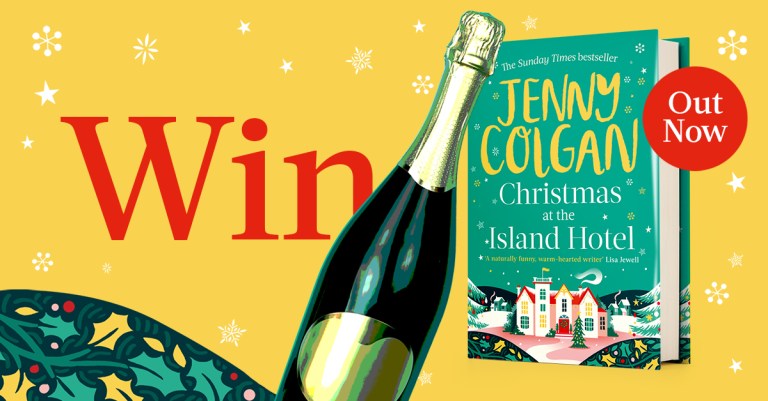Exclusive extract of Christmas at the Island Hotel by Jenny Colgan!

Chapter One
Day and night, the great tankers plough the freezing water of the North Atlantic.
Vast up close – 200, 300 metres long, filled with cars and rocking horses and teddies and barometers and valves and bonnets and tea – they are nonetheless still dwarfed by the scale of the ocean.
Coming in from the west, they cross imaginary lines in the water that the comfortable and landbound hear about only as they fall to sleep to the shipping forecast – Rockall, Hebrides and over the north of Fair Isle – when they loom into view of Mure, the tiny island between Shetland and the Faroes, home to fifteen hundred souls (in a good year).
The south-westernmost tip of Mure contains the village and the port, and the sailors of the tankers – often from the Philippines or Thailand, the great seafaring nations of the South Seas – are about as far away from home as they can ever get. They look out, often, on the little point of light marooned in the ocean, eyes starved of diversion from the endless dark waves.
You cannot be a seafaring man if prone to melancholy – you will live away from your family, in close quarters with other men, for nine or ten months of the year, so a positive attitude is best. But even the most sea-hardened occasionally get a little mournful for home, particularly when they pull up the binoculars and see the coloured houses of Mure crowded higgledy-piggledy on the wharf, all soft grey and pink and blue and yellow. The cottages and buildings cluster together, heading upwards from the waterside, in a cosy, haphazard fashion, as if leaning against each other for warmth on the bare island with its vast empty pale yellow beaches and low bending rushes.
There is no deep-water harbour on the island. None of the great container ships will ever land there. But more than a few like to mark her passing, as she is the last spot of land they will see before Bergen. Sometimes, through the binoculars, on a clear day in the summertime, you can see the children wave.
But now, in the pitch-black of an early winter’s morning, it looks like a tiny pinprick of comfort in a world gone dark, as the huge ships chug past, making light work of the slapping waves, the motion so familiar that walking on land is a difficult adjustment for the men.
The island is so small that, at twenty knots, it doesn’t take long for it to disappear behind you: for Apostil or Danilo or Jesús to go back to checking the radar and the fax machine, as they sail between Viking and on to North Utsire, and ultimately to the vast rich fjords of Norway, leaving the quiet island marooned once more under the cold stars – where, in the MacKenzie farmhouse, at the very southernmost tip of the island, the early morning fire is going and the coffee is heating on the stove, and Flora MacKenzie is currently in the middle of having a furious stand-up argument with her younger brother Fintan.
‘Colton’s Bar,’ she repeated. ‘Absolutely not. I mean, I understand it, but also it sounds like a saloon where girls wear hot pants and fringing and cowboy boots and ask how y’all doing and we have a mechanical horse.’
‘Nobody said anything about a mechanical horse,’ grumbled Fintan, breathing in the scent of his coffee and the fresh rolls warming in the oven. Then he looked up.
‘Hmm,’ he said. ‘Mechanical horse.’ ‘Do I have to take that coffee off you?’
Fintan rolled his eyes. ‘Anything but that.’
It had only been a year since Fintan’s husband Colton had died of cancer. Fintan had good days and bad days. This was not shaping up to be a good day. There weren’t many good days.
Colton had left Fintan the Rock, the hotel he had always dreamed of opening on the island, and it was finally coming to fruition. But there were a million and one little details and he wasn’t enjoying that side of things in the slightest. The hotel had been useful: it had kept Fintan phenomenally busy and helped keep the grief at bay – sheer exhaustion was his friend when it came to sleeping alone in a very big bed. Plus they had bookings for Christmas Day. They had to open, and quickly.
Flora technically had nothing to do with it.
But somehow, as she already had catering experience running the Seaside Kitchen down on the shore, she couldn’t stop poking her nose in. Also, she was meant to be on maternity leave which, as far as Fintan (and not just Fintan) was concerned, was leaving her with far too much time on her hands to interfere.
‘Look,’ she said. ‘I think the Rogers Bar is fine. Just not so on the nose, you know?’
Fintan pouted.
There was a commotion at the entrance to the kitchen. Fintan was staying at the farmhouse, as was his brother Innes and his family. Innes’s daughter Agot, five, was marching into the kitchen in her nightie, a serious look on her face, a thin wail rising behind her from the corridor.
‘Bugliss Binder is awake,’ she said with a sniff. ‘I think he’s a bad baby, Auntie Flora. He is very cross.’
‘Douglas,’ said Flora for the nine hundredth time. ‘His name is Douglas.’
Agot and Fintan gave her a similarly dry look.
‘What?’ said Flora. ‘She watches Hey Duggee all the time.’
‘Hey Duggee is a very good dog,’ said Agot loudly. Then: ‘I’m not sure about Buglish.’
She marched over to the retired sheepdog Bramble and the two of them went outside to examine the vegetable garden. Agot had a very strong resistance to actually eating vegetables, but she liked watching them grow, even at this time of year.
‘She’s doing that on purpose,’ said Flora, heading out. ‘She can speak perfectly well.’
‘She is,’ said Fintan. ‘And yet you somehow let it rile you.’
Flora headed towards the back room, even though the baby was barely crying, thinking Agot was ridiculous, and then she realised she was mentally having an argument with her five-year-old niece which was a waste of time if she’d ever known one, but it didn’t matter, because by the time she got there, Joel was already with him, and Douglas had fallen silent.
He looked so like his father – black eyes and already, at five months, a shock of black curly hair – it was actually hilarious. Almost everyone who met him had felt the urge to put a pair of glasses on him.
She stood in the doorframe for a moment, watching them both. Douglas didn’t smile much – he was not at all a smiley baby; his little face was grave and serious, as if he had been born knowing all the mysteries of a universe he would gradually forget as he grew older. He also shared his father’s serious demeanour, being watchful and careful. For a long time, Flora had thought that Joel was like that because of his difficult upbringing – he had been in and out of foster homes since he was very little – but she was coming to think, that in fact Joel’s demeanour was innate as, it had turned out, never was a baby boy smothered with so much love and affection as Douglas was, coming in to a home with four uncles at close quarters and his grandfather, Eck, who worshipped him and did many of the babysitting duties. Then there were his adopted American grandparents, Mark and Marsha, who sent vast care packages of ridiculously expensive baby clothes imported from France, via New York, which were frankly a little too good for the muddy farmyard and changeable climate of a small very northern Scottish island, but Flora made sure he was dutifully photographed in them all anyway.
Joel didn’t fuss Douglas or sing to him. He just lay down on the bed next to him and the two of them eyeballed each other. It was the oddest thing, as if something intangible flowed between them through eye contact alone. Joel’s large hand would reach out so Douglas could clasp a tiny finger, and then they would commune. Flora didn’t know if this was normal, but it was sweet. Sometimes Douglas would flap at Joel’s heavy gold watch and Joel would let him. Usually, after fifteen minutes of this, they would both be asleep, the long body gently cradling the tiny one.
Flora was supposedly on maternity leave with Isla and Iona running the café perfectly well, somewhat to Flora’s annoyance. But it was Joel, her workaholic boyfriend, who appeared to have taken parental leave most to heart, and Flora couldn’t help occasionally feeling just a little jealous. Which was, of course, completely ridiculous. Everything was great. Fine. Great. Sure, Douglas cried at her and was totally calm with Joel but she didn’t mind. Not a bit.
Chapter Two
‘Well, which is the best one?’
Isla Donnelly’s mother Vera was looking at her over the old teapot with the flowers and the chip in the top.
Isla, staring at it, realised something she had never quite put into words before: she hated that teapot. It was the stupidest thing she could imagine, hating a teapot. It was possibly because her mother treated it like a precious heirloom she needed to be more careful with rather than just a dumb, crappy teapot.
She sipped her tea.
‘I don’t know, Mum,’ she said again, trying not to get riled, which wouldn’t help.
‘So, the MacKenzies need someone up at the new posh hotel?’ Vera Donnelly sniffed loudly. She didn’t think much of the new hotel. Not the kind of thing Mure needed, in her opinion, and Vera had a lot of opinions. Too fancy, too expensive, who wanted that kind of thing?
Regardless, it was set to open this Christmas, and Flora had offered to help Fintan by moving one of her café staff up there.
Isla sighed. She was in fact indeed quite terrified, but she would never tell her mother that. Not good to give her the ammunition. ‘Well, one of us will stay and take over more of the running of
the Seaside Kitchen and one of us will go up to the Rock.’
Isla and her best friend Iona had worked in the Summer Seaside Kitchen for years, and neither was looking forward to being separated. Isla in particular was very much the shyer of the two and was absolutely dreading being without her cheeky chum.
‘Yes, but which one is the best job?’ ‘I don’t know.’
Vera carefully picked up her treasured teapot and daintily poured herself another cup of tea.
‘You know I just don’t want them taking advantage of you,’ she said. ‘That Flora treats you like a scullery maid.’
‘I’ve just been learning on the job,’ said Isla, who adored Flora and didn’t have quite her mother’s expectations. It was difficult being Vera’s only child. She hated constantly adding to her disappointment.
Isla’s main goal was to stop herself being Vera’s only area of attention.
‘What are you doing today, Mum?’ ‘It’s Homes under the Hammer!’
‘You know there’s a choir rehearsal tonight . . . you should go to that.’
‘Bunch of busybodying old gossips. No, thanks!’
Isla pulled on her coat and pulled her tam-o’-shanter down over her unruly dark chestnut curls, which pinged out every which way, unusual on the island where people had fair or red hair depending on whether they were descended from Celts or Vikings. There had once been a rumour of Spanish invaders making it as far north as Mure, which would have made more sense of her green eyes, although the pale skin, lightly freckled in the summertime, was purest Scotland to Isla’s eternal chagrin.
A nor’wester was blowing down from the Arctic Circle straight into Mure, and it made walking in a straight line quite difficult, but it wasn’t far to the little Seaside Kitchen, down two cobbled streets and on to the sea-front.
The little café was always warm: the baking ovens through the back never really quite cooled down and on the freezing winter mornings it was cosy even before Isla lit the golden lamps that, together with the cheery spotted tablecloths and the pretty pictures on the wall, made the café so inviting. Iona would already be brewing up coffee and together they could make a start on the scones, pies, tarts and cakes for the day, while Mrs Laird popped off the freshly baked bread, the coffee machine hissed and ground in a comforting fashion and the day could begin. And it wouldn’t be long before the first chilled worker arrived, fresh from milking or a fishing boat or waiting on the earliest ferry of the morning.
‘Bye, Mum,’ she said.
‘Aye well. Good luck then,’ said her mother grudgingly as she left, and Isla reminded herself it was only because her mother loved her and wanted the best for her. Even when it felt unpleasant.






